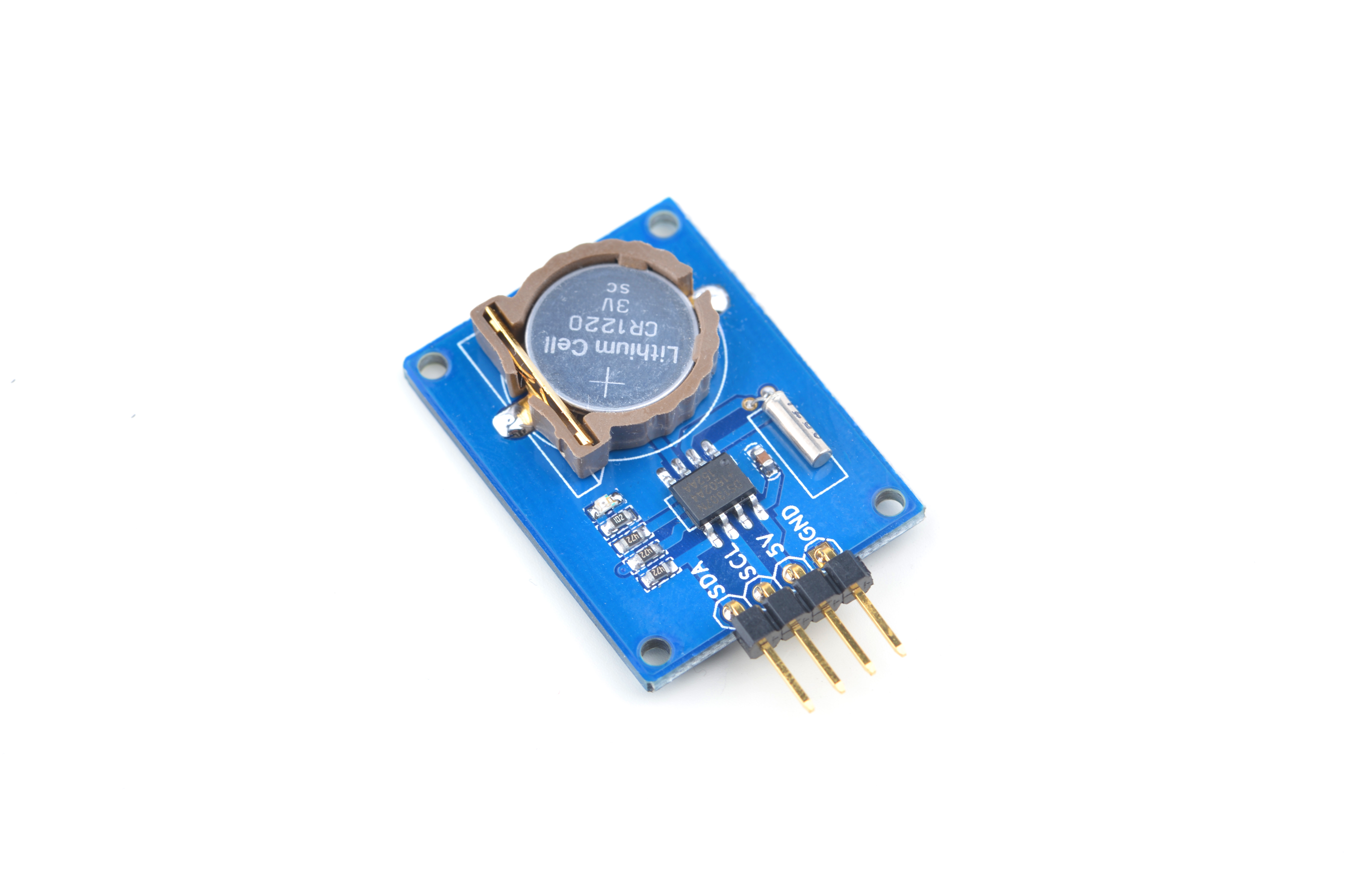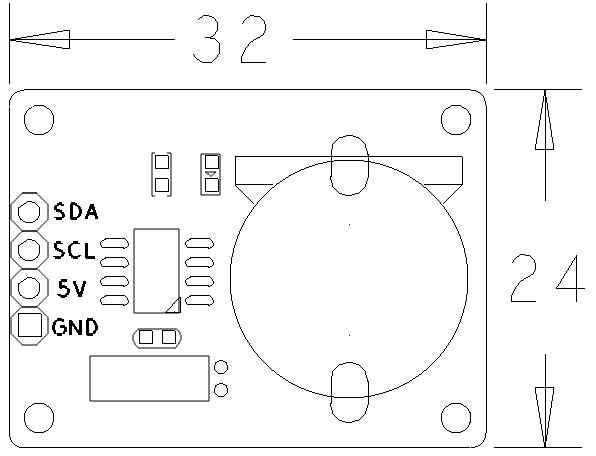Difference between revisions of "Matrix - RTC"
(→代码展示) |
(→与Tiny4412连接使用) |
||
| Line 174: | Line 174: | ||
</syntaxhighlight> | </syntaxhighlight> | ||
| − | == | + | ==Connect to Tiny4412== |
| − | === | + | ===Preparations=== |
| − | + | Please refer to the Tiny4412's user's manual to install a UbuntuCore on the Tiny4412 and install an appropriate cross compiler on a PC.<br> | |
| − | + | Note: only the Tiny4412SDK-1506 carrier board can work with this module. | |
| − | === | + | ===Hardware Connection=== |
| − | + | Please refer to the following diagram to connect the Matrix-RTC to the Tiny4412 <br> | |
[[File:Matrix-RTC_tiny4412.jpg|frameless|600px|Matrix-RTC_tiny4412]] | [[File:Matrix-RTC_tiny4412.jpg|frameless|600px|Matrix-RTC_tiny4412]] | ||
| − | + | Connection Details: | |
{| class="wikitable" | {| class="wikitable" | ||
|- | |- | ||
| Line 197: | Line 197: | ||
|} | |} | ||
| − | === | + | ===Compile Test Program=== |
| − | + | Please login the Matrix hub and enter the matrix-tiny4412 branch | |
<syntaxhighlight lang="bash"> | <syntaxhighlight lang="bash"> | ||
$ cd matrix | $ cd matrix | ||
| Line 204: | Line 204: | ||
</syntaxhighlight> | </syntaxhighlight> | ||
| − | + | Compile the Matrix code | |
<syntaxhighlight lang="bash"> | <syntaxhighlight lang="bash"> | ||
$ make CROSS_COMPILE=arm-linux-gnueabihf- clean | $ make CROSS_COMPILE=arm-linux-gnueabihf- clean | ||
| Line 210: | Line 210: | ||
$ make CROSS_COMPILE=arm-linux-gnueabihf- install | $ make CROSS_COMPILE=arm-linux-gnueabihf- install | ||
</syntaxhighlight> | </syntaxhighlight> | ||
| − | + | Note: please make sure to install the cross compiler "arm-linux-gnueabihf-gcc-4.7.3" on your PC, which is used to compile files for the Tiny4412-UbuntuCore.<br> | |
| − | + | Generated library files are under the "install/lib" directory. Applications are under the "install/usr/bin" directory. The test program for the "Matrix-RTC" module is "matrix-rtc". | |
| − | === | + | ===Run Test Program=== |
| − | + | Please copy the library files and test program to the Tiny4412 | |
<syntaxhighlight lang="bash"> | <syntaxhighlight lang="bash"> | ||
$ cp install/usr/bin/* tiny4412_rootfs/usr/bin/ | $ cp install/usr/bin/* tiny4412_rootfs/usr/bin/ | ||
| Line 220: | Line 220: | ||
</syntaxhighlight> | </syntaxhighlight> | ||
| − | + | Power on the Tiny4412 and run the following command in UbuntuCore's terminal to load the driver. | |
<syntaxhighlight lang="bash"> | <syntaxhighlight lang="bash"> | ||
$ modprobe bmp085-i2c | $ modprobe bmp085-i2c | ||
</syntaxhighlight> | </syntaxhighlight> | ||
| − | + | Run the test program <br> | |
| − | + | Note: this module is not plug and play therefore before running the module please make sure it is connected to a Tiny4412. | |
<syntaxhighlight lang="bash"> | <syntaxhighlight lang="bash"> | ||
$ matrix-rtc | $ matrix-rtc | ||
</syntaxhighlight> | </syntaxhighlight> | ||
| − | === | + | ===Code Sample=== |
<syntaxhighlight lang="c"> | <syntaxhighlight lang="c"> | ||
static const char default_rtc[] = "/dev/rtc0"; | static const char default_rtc[] = "/dev/rtc0"; | ||
Revision as of 08:38, 30 September 2015
Contents
1 Introduction
2 Features
- Pin Description:
| Pin | Description |
| SDA | I2C SDA |
| SCL | I2C SCL |
| 5V | Supply Voltage 5V |
| GND | Ground |
3 Basic Device Operation
4 Download Matrix Source Code
All the matrix modules' code samples are open source. They are maintained on GitHub - git://github.com/friendlyarm/matrix.git
Each branch in this hub contains the matrix modules' code samples for a board that the matrix modules can work with.
- The nanopi branch contains the matrix modules' code samples for the NanoPi
- the tiny4412 branch contains the matrix modules' code samples for the Tiny4412
- the raspberrypi branch contains the matrix modules' code samples for the RaspberryPi
Please follow the steps below to get the source code:
Install the git utility on a PC running Ubuntu14.04
$ sudo apt-get install git
Clone the matrix code from GitHub
$ git clone git://github.com/friendlyarm/matrix.git
If this is successful a "matrix" directory will be generated, which will contain all the matrix modules' code samples.
5 Connect to NanoPi
5.1 Preparations
Please install a Debian on a NanoPi and an appropriate cross compiler on a PC. Please refer to wiki:NanoPi
Compile a NanoPi kernel. Note: please use the kernel's source code from the nanopi-v4.1.y-matrix branch.
$ git clone https://github.com/friendlyarm/linux-4.x.y.git $ cd linux-4.x.y $ git checkout nanopi-v4.1.y-matrix $ make nanopi_defconfig $ touch .scmversion $ make
5.2 Hardware Connection
Please refer to the following connection diagram to connect the Matrix-RTC to the NanoPi
Matrix-RTC_nanopi
连接说明:
| Matrix-RTC_nanopi | NanoPi |
| SDA | Pin3 |
| SCL | Pin5 |
| 5V | Pin4 |
| GND | Pin6 |
5.3 Compile Test Program
Please login the matrix hub and enter the nanopi branch
$ cd matrix $ git checkout nanopi
Compile the matrix code
$ make CROSS_COMPILE=arm-linux- clean $ make CROSS_COMPILE=arm-linux- $ make CROSS_COMPILE=arm-linux- install
Note: please make sure to install the cross compiler "arm-linux-gcc-4.4.3" on your PC, which is used to compile files for the NanoPi-Debian.
Generated library files are under the "install/lib" directory. Applications are under the "install/usr/bin" directory. The test program for the "Matrix-RTC" module is "matrix-rtc".
5.4 Run Test Program
Please copy the library files and test program to the NanoPi
$ cp install/usr/bin/* nanopi_rootfs/usr/bin/ $ cp install/lib/* nanopi_rootfs/lib/ -d
Power on the NanoPi and run the following command in Debian's terminal to load the driver
$ modprobe rtc-ds1307Run the test program
Note: this module is not plug and play therefore before running the module please make sure it is connected to a NanoPi.
$ matrix-rtc5.5 Code Sample
static const char default_rtc[] = "/dev/rtc0"; static const char default_date_time[] = "2015 9 15 1 1 1"; int main(int argc, char **argv) { int fd, retval; struct rtc_time rtc_tm; const char *rtc = default_rtc; const char *date_time = default_date_time; switch (argc) { case 3: rtc = argv[1]; date_time = argv[2]; break; case 1: break; default: fprintf(stderr, "usage: rtctest [rtcdev] [year mon day hour min sec]\n"); return 1; } fd = open(rtc, O_RDONLY); if (fd == -1) { perror(rtc); exit(errno); } fprintf(stderr, "RTC Driver Test Example.\n"); sscanf(date_time, "%d %d %d %d %d %d", &rtc_tm.tm_year, &rtc_tm.tm_mon, &rtc_tm.tm_mday, &rtc_tm.tm_hour, &rtc_tm.tm_min, &rtc_tm.tm_sec); rtc_tm.tm_year -= 1900; rtc_tm.tm_mon -= 1; retval = ioctl(fd, RTC_SET_TIME, &rtc_tm); if (retval == -1) { perror("RTC_SET_TIME ioctl"); exit(errno); } fprintf(stderr, "Set RTC date/time is %d-%d-%d, %02d:%02d:%02d.\n", rtc_tm.tm_mon + 1, rtc_tm.tm_mday, rtc_tm.tm_year + 1900, rtc_tm.tm_hour, rtc_tm.tm_min, rtc_tm.tm_sec); /* Read the RTC time/date */ retval = ioctl(fd, RTC_RD_TIME, &rtc_tm); if (retval == -1) { perror("RTC_RD_TIME ioctl"); exit(errno); } fprintf(stderr, "Read RTC date/time is %d-%d-%d, %02d:%02d:%02d.\n", rtc_tm.tm_mon + 1, rtc_tm.tm_mday, rtc_tm.tm_year + 1900, rtc_tm.tm_hour, rtc_tm.tm_min, rtc_tm.tm_sec); fprintf(stderr, "Test complete\n"); close(fd); return 0; }
6 Connect to Tiny4412
6.1 Preparations
Please refer to the Tiny4412's user's manual to install a UbuntuCore on the Tiny4412 and install an appropriate cross compiler on a PC.
Note: only the Tiny4412SDK-1506 carrier board can work with this module.
6.2 Hardware Connection
Please refer to the following diagram to connect the Matrix-RTC to the Tiny4412
Matrix-RTC_tiny4412
Connection Details:
| Matrix-RTC | Tiny4412 |
| SDA | CON18 SDA |
| SCL | CON18 SCL |
| 5V | CON18 5V |
| GND | CON18 GND |
6.3 Compile Test Program
Please login the Matrix hub and enter the matrix-tiny4412 branch
$ cd matrix $ git checkout tiny4412
Compile the Matrix code
$ make CROSS_COMPILE=arm-linux-gnueabihf- clean $ make CROSS_COMPILE=arm-linux-gnueabihf- $ make CROSS_COMPILE=arm-linux-gnueabihf- install
Note: please make sure to install the cross compiler "arm-linux-gnueabihf-gcc-4.7.3" on your PC, which is used to compile files for the Tiny4412-UbuntuCore.
Generated library files are under the "install/lib" directory. Applications are under the "install/usr/bin" directory. The test program for the "Matrix-RTC" module is "matrix-rtc".
6.4 Run Test Program
Please copy the library files and test program to the Tiny4412
$ cp install/usr/bin/* tiny4412_rootfs/usr/bin/ $ cp install/lib/* tiny4412_rootfs/lib/ -d
Power on the Tiny4412 and run the following command in UbuntuCore's terminal to load the driver.
$ modprobe bmp085-i2cRun the test program
Note: this module is not plug and play therefore before running the module please make sure it is connected to a Tiny4412.
$ matrix-rtc6.5 Code Sample
static const char default_rtc[] = "/dev/rtc0"; static const char default_date_time[] = "2015 9 15 1 1 1"; int main(int argc, char **argv) { int fd, retval; struct rtc_time rtc_tm; const char *rtc = default_rtc; const char *date_time = default_date_time; switch (argc) { case 3: rtc = argv[1]; date_time = argv[2]; break; case 1: break; default: fprintf(stderr, "usage: rtctest [rtcdev] [year mon day hour min sec]\n"); return 1; } fd = open(rtc, O_RDONLY); if (fd == -1) { perror(rtc); exit(errno); } fprintf(stderr, "RTC Driver Test Example.\n"); sscanf(date_time, "%d %d %d %d %d %d", &rtc_tm.tm_year, &rtc_tm.tm_mon, &rtc_tm.tm_mday, &rtc_tm.tm_hour, &rtc_tm.tm_min, &rtc_tm.tm_sec); rtc_tm.tm_year -= 1900; rtc_tm.tm_mon -= 1; retval = ioctl(fd, RTC_SET_TIME, &rtc_tm); if (retval == -1) { perror("RTC_SET_TIME ioctl"); exit(errno); } fprintf(stderr, "Set RTC date/time is %d-%d-%d, %02d:%02d:%02d.\n", rtc_tm.tm_mon + 1, rtc_tm.tm_mday, rtc_tm.tm_year + 1900, rtc_tm.tm_hour, rtc_tm.tm_min, rtc_tm.tm_sec); /* Read the RTC time/date */ retval = ioctl(fd, RTC_RD_TIME, &rtc_tm); if (retval == -1) { perror("RTC_RD_TIME ioctl"); exit(errno); } fprintf(stderr, "Read RTC date/time is %d-%d-%d, %02d:%02d:%02d.\n", rtc_tm.tm_mon + 1, rtc_tm.tm_mday, rtc_tm.tm_year + 1900, rtc_tm.tm_hour, rtc_tm.tm_min, rtc_tm.tm_sec); fprintf(stderr, "Test complete\n"); close(fd); return 0; }

